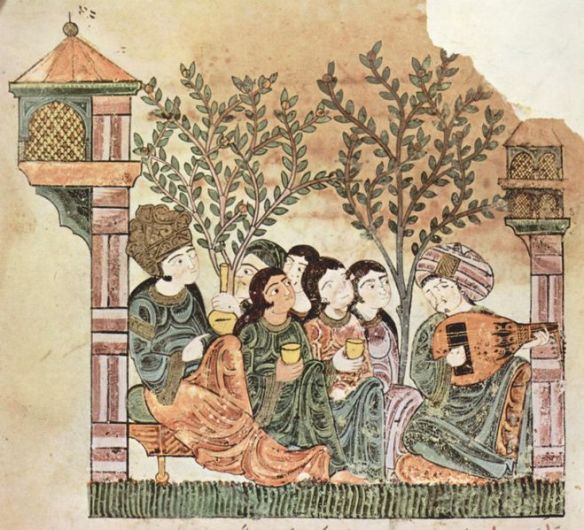One of my favorite English poems of all time is reminiscent of Sufi poetry about Layla, whose name means “night,” and who symbolizes the beloved Divine Essence/Essence of the Self.

Lord Byron

When you are kind, you are the candle of the soul, soft and pliable as wax
Do no be wild because you will meet her face to face
her charm will make you as cool and pliant as the earth
Throw away your armor and bare your chest at the moment of battle
there is no better protection nor armor than her.
That’s why in every Sufi retreat, all the openings are are sealed shut
so that from your light the house becomes more illumined
در دو چشم من نشین ای آن که از من منتری
تا قمر را وانمایم کز قمر روشنتری
اندرآ در باغ تا ناموس گلشن بشکند
ز آنک از صد باغ و گلشن خوشتر و گلشنتری
تا که سرو از شرم قدت قد خود پنهان کند
تا زبان اندرکشد سوسن که تو سوسنتری
وقت لطف ای شمع جان مانند مومی نرم و رام
وقت ناز از آهن پولاد تو آهنتری
چون فلک سرکش مباش ای نازنین کز ناز او
نرم گردی چون زمین گر از فلک توسنتری
زان برون انداخت جوشن حمزه وقت کارزار
کز هزاران حصن و جوشن روح را جوشنتری
زان سبب هر خلوتی سوراخ روزن را ببست
کز برای روشنی تو خانه را روشنتری
Ibn al-Farid
Every part of me kissed her veil
With every mouth whose touch held every kiss
If she dissolved my body, she would see in every atom
each and every heart filled with each and every love
Original:
ويلثم مني كلّ جزء لثامها
بكلّ فم فى لثمه كلّ قبلة
فلو بسطت جسمي رأت كلّ جوهر
به كلّ قلب فيه كلّ محبة
Translation:
If I sought consolation, who would be there to be my guide
when in love, every leader follows my lead?
In my every limb is every yearning for her
and every longing tugs at my reins
As she bends, I imagine every hip she moves
to be a branch in a sand dune topped by the full moon
Mine is every limb filled with every inner core
wherein, when she glances, is embedded every arrow
And if she dissolved my body she would find every atom
every heart inhabited by every human love
In union with her, a year to me is but an instant,
an hour’s separation like a year.
When we met at nightfall, as the twin straight paths
between her dwelling and my tents brought us together,
We moved away a little from the tribe,
avoiding spies and slanderers with their deceitful talk
I spread my cheek upon the ground for her to walk upon
and she said, “Good news, now you may kiss my veil.”
But this my soul did not permit me, jealously
shielding her from me, for higher is my purpose
We passed the night in hope as my wish decreed
and I saw the world my kingdom and time itself my slave.
Translation modified from Stefan Sperl’s in Stefan Sperl, C. Shackle, Qasida Poetry in Islamic Asia and Africa
بمنْ أهتَدي في الحبِّ لو رُمْتُ سَلوَةً
وبي يقتَدي ، في الحبِّ ، كلُّ إمامِ
وفي كلِّ عُضوٍ فيَّ كلُّ صبابَةٍ
إليها ، وشَوْقٍ جَاذِبٍ بِزِمَامي
تَثَنَّتْ ، فَخِلْنا كلَّ عِطْفٍ تهُزُّهُ
قَضيبَ نقاً ، يَعْلُوهُ بَدْرُ تَمامِ
ولي كلُّ عُضوٍ ، فيهِ كلُّ حشىً بها
إذا ما رَنَتْ ، وَقْعٌ لكلِّ سِهامِ
ولوْ بسطتْ جسْمي رأتْ كلَّ جوهرٍ
بهِ كلُّ قلبٍ ، فيهِ كلُّ غَرامِ
وفي وَصْلِها ، عامٌ لدَيَّ كَلَحْظَةٍ
وساعَةُ هِجْرَانٍ عَلَيَّ كَعَامِ
ولمَّا تَلاقَينا عِشاءً ، وضَمَّنا
سواءُ سبيلَيْ دَارِها وخِيامي
ومِلْنا كذا شيئاً عنِ الحيِّ ، حيثُ لا
رَقيبٌ ، ولا وَاشٍ بِزَوْرِ كَلامِ
فرَشْتُ لها خَدِّي ، وِطاءً ، على الثَّرَى
فقالتْ : لكَ البُشرَى بِلَثمِ لِثامي
فما سَمَحَتْ نَفسي بذلِكَ ، غَيْرَةً
على صَوْنِها مِنِّي لِعزِّ مرامي
وبِتْنا ، كما شاءَ اقتراحي ، على المُنى
أرَى المُلكَ مُلكي والزَّمانَ غُلامي
Translation:
You seek Layla, but she reveals herself within you
You think she’s other, but she’s not other than you
And that’s a madness that is apparent to the cult of lovers
So be careful, for otherness is the essence of being cut off
Don’t you see how her beauty envelops you?
She disappears only when you reject part of yourself
“Come close to me,” you say to she who is your All
And when she loves you, she leads you to yourself
Meeting her is bliss beyond description
and none reach her, save those who see meaning without forms
I was so in love with her that I would have vanished in her love
had she not sworn that I only obey her
I concealed her from people with fantasy
After having revealed her, truly, inside my cloak.
I hid her from myself, with the robe of my worlds,
And from my envy, out of the severity of my jealousy
O Dazzling beauty! Should the light of your face
Touch the eyes of a blind man, he would see every atom
She is adorned with each and every charm and grace of beauty
And wherever she appears, she is desired by those who love.
Original:
أَتَطلُبُ لَيلى وَهيَ فيكَ تَجَلَّت وَتَحسَبُها غَيراً وَغَيرُكَ لَيسَتِ
فَذابلُهُ في مِلَّةِ الحُبِّ ظاهِرٌ فَكُن فَطِناً فَالغيرُ عَينُ القَطيعَةِ
أَلَم تَرَها أَلقَت عَلَيكَ جَمالَها وَلَو لَم تَقُم بِالذاتِ مِنكَ اِضمَحَلَّتِ
تَقولُ لَها اُدنُ وَهيَ كُلَّك ثُمَّ إِن حَبَتكَ بِوَصلٍ أَوهَمَتكَ تَدَلَّتِ
عَزيزٌ لِقاها لا يَنالُ وِصالَها سِوى مَن يَرى مَعنىً بِغَيرِ هَوِيَّةِ
كَلِفت بِها حَتّى فَنِيتُ بِحُبِّها فَلَو أَقسَمَت أَنّيَ إِيّاها لَبَرَّتِ
وَغالَطتُ فيها الناسَ بِالوَهمِ بَعدَما تَبَيَّنتها حَقّاً بِداخِلِ بُردَتي
وَغَطَّيتُها عَنّي بِثَوبِ عَوالِمي وَعَن حاسِدي فيها لِشِدَّةِ غيرَتي
بَديعَة حُسنٍ أَو بَدا نورُ وَجهِها إِلى أَكمَهٍ أَضحى يَرى كُلَّ ذَرَّةِ
تحلّت بأنواع الجمال بأسرها فهام بها أهل الهوى حيثُ حلّت













































